

Vinicius Vacanti sur Twitter : "It took 15+ years, but the NASDAQ is now back to where it was in 1999. Crazy. Jonathan Ive and the Future of Apple. I.

Launch Day In recent months, Sir Jonathan Ive, the forty-seven-year-old senior vice-president of design at Apple—who used to play rugby in secondary school, and still has a bench-pressing bulk that he carries a little sheepishly, as if it belonged to someone else—has described himself as both “deeply, deeply tired” and “always anxious.” When he sits down, on an aluminum stool in Apple’s design studio, or in the cream leather back seat of his Bentley Mulsanne, a car for a head of state, he is likely to emit a soft, half-ironic groan. The Software Revolution. In human history, there have been three great technological revolutions and many smaller ones.
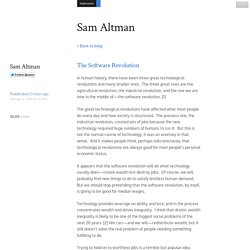
The three great ones are the agricultural revolution, the industrial revolution, and the one we are now in the middle of—the software revolution. [1] The great technological revolutions have affected what most people do every day and how society is structured. The previous one, the industrial revolution, created lots of jobs because the new technology required huge numbers of humans to run it. But this is not the normal course of technology; it was an anomaly in that sense. And it makes people think, perhaps subconsciously, that technological revolutions are always good for most people’s personal economic status. It appears that the software revolution will do what technology usually does—create wealth but destroy jobs. Technology provides leverage on ability and luck, and in the process concentrates wealth and drives inequality.
What can we do? The Chaos Theory Of Startups. "Since we don't know where we're going, we have to stick together in case someone gets there" - Ken KeseyI was flying from NY to SF the other day and at one point the gentleman I was sitting next to asked me if I was flying towards or away from home.
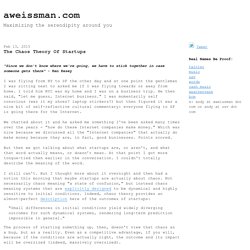
I told him NYC was my home and I was on a business trip. He then said, "let me guess, Internet business. " I was momentarily self conscious (was it my shoes? Laptop stickers?) But then figured it was a nice bit of self-reflective cultural commentary: everyone flying to SF is going there for the Internet. We chatted about it and he asked me something I've been asked many times over the years - "how do these Internet companies make money. " Basketball, Startups, and Life. When you watch the San Antonio Spurs (or the Atlanta Hawks this season), you get a sense of a system at work on the court.
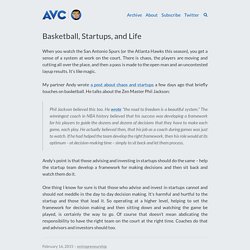
There is chaos, the players are moving and cutting all over the place, and then a pass is made to the open man and an uncontested layup results. It’s like magic. My partner Andy wrote a post about chaos and startups a few days ago that briefly touches on basketball. He talks about the Zen Master Phil Jackson: Phil Jackson believed this too. Andy’s point is that those advising and investing in startups should do the same – help the startup team develop a framework for making decisions and then sit back and watch them do it.
One thing I know for sure is that those who advise and invest in startups cannot and should not meddle in the day to day decision making. It’s Sofa King More Effective to Pick up the Phone. Phone calls.
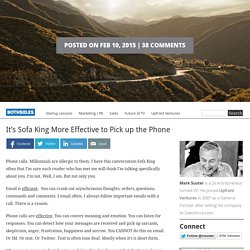
Millennials are allergic to them. I have this conversation Sofa King often that I’m sure each reader who has met me will think I’m talking specifically about you. I’m not. Well, I am. But not only you. Email is efficient. Phone calls are effective. Of course in-person is best for true relationship development but that’s not always practical.
A very common experience … One person emails some thoughts. I’ve written before about the dehumanization of other people and their feeling with written words – exacerbated by anonymous apps. So my appeal to those in confrontational situations is to pick up the phone – even if it makes you uncomfortable. Pick up the phone. I’ve written about the art of the phone call before but thought I’d include a primer below for those with less experience. 1. 2. Two things to watch for: 1) if you’re trying banter to build rapport but not “feeling it” then quickly shift to business. Bad Advice. Founders put a lot of effort into raising money from the perfect mix of angels or raising a top tier series A.

Unfortunately, a number of brand name investors will give you bad advice. Most of the time, this is out of a good natured attempt to help you. Occasionally, it is due to an investor trying to take advantage of you[1]. Some High-Tech Career Counseling Tips. I get a fair number of emails and calls from former colleagues and friends asking for career advice.
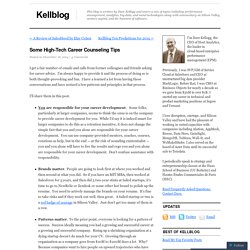
I’m always happy to provide it and the process of doing so is both thought-provoking and fun. I have a learned a lot from having these conversations and have noticed a few patterns and principles in that process.